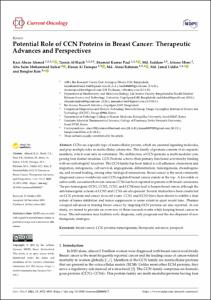Full metadata record
| DC Field | Value | Language |
|---|---|---|
| dc.contributor.author | Ahmed, Kazi Ahsan | - |
| dc.contributor.author | Hasib, Tasnin Al | - |
| dc.contributor.author | Paul, Shamrat Kumar | - |
| dc.contributor.author | Saddam, Md. | - |
| dc.contributor.author | Mimi, Afsana | - |
| dc.contributor.author | Saikat, Abu Saim Mohammad | - |
| dc.contributor.author | Faruque, Hasan Al | - |
| dc.contributor.author | Rahman, Md. Ataur | - |
| dc.contributor.author | Uddin, Md. Jamal | - |
| dc.contributor.author | Kim, Bonglee | - |
| dc.date.accessioned | 2021-12-08T12:30:02Z | - |
| dc.date.available | 2021-12-08T12:30:02Z | - |
| dc.date.created | 2021-12-06 | - |
| dc.date.issued | 2021-12 | - |
| dc.identifier.issn | 1718-7729 | - |
| dc.identifier.uri | http://hdl.handle.net/20.500.11750/15920 | - |
| dc.description.abstract | CCNs are a specific type of matricellular protein, which are essential signaling molecules, and play multiple roles in multicellular eukaryotes. This family of proteins consists of six separate members, which exist only in vertebrates. The architecture of CCN proteins is multi-modular com-prising four distinct modules. CCN Proteins achieve their primary functional activities by binding with several integrin7 receptors. The CCN family has been linked to cell adhesion, chemotaxis and migration, mitogenesis, cell survival, angiogenesis, differentiation, tumorigenesis, chondrogenesis, and wound healing, among other biological interactions. Breast cancer is the most commonly diagnosed cancer worldwide and CCN regulated breast cancer stands at the top. A favorable or unfa-vorable association between various CCNs has been reported in patients with breast carcinomas. The pro-tumorigenic CCN1, CCN2, CCN3, and CCN4 may lead to human breast cancer, although the anti-tumorigenic actions of CCN5 and CCN6 are also present. Several studies have been conducted on CCN proteins and cancer in recent years. CCN1 and CCN3 have been shown to exhibit a dual nature of tumor inhibition and tumor suppression to some extent in quiet recent time. Pharmacological advances in treating breast cancer by targeting CCN proteins are also reported. In our study, we intend to provide an overview of these research works while keeping breast cancer in focus. This information may facilitate early diagnosis, early prognosis and the development of new therapeutic strategies. © 2021 by the authors. | - |
| dc.language | English | - |
| dc.publisher | MDPI | - |
| dc.title | Potential role of ccn proteins in breast cancer: Therapeutic advances and perspectives | - |
| dc.type | Article | - |
| dc.identifier.doi | 10.3390/curroncol28060417 | - |
| dc.identifier.scopusid | 2-s2.0-85120311369 | - |
| dc.identifier.bibliographicCitation | Current Oncology, v.28, no.6, pp.4972 - 4985 | - |
| dc.description.isOpenAccess | TRUE | - |
| dc.subject.keywordAuthor | Breast cancer | - |
| dc.subject.keywordAuthor | CCN proteins | - |
| dc.subject.keywordAuthor | Prospects | - |
| dc.subject.keywordAuthor | Therapeutic advances | - |
| dc.subject.keywordAuthor | Tumorigenesis | - |
| dc.subject.keywordPlus | TISSUE-GROWTH-FACTOR | - |
| dc.subject.keywordPlus | FACTOR CTGF/CCN2 | - |
| dc.subject.keywordPlus | BONE METASTASIS | - |
| dc.subject.keywordPlus | EXPRESSION | - |
| dc.subject.keywordPlus | DIFFERENTIATION | - |
| dc.subject.keywordPlus | FAMILY | - |
| dc.subject.keywordPlus | CELLS | - |
| dc.subject.keywordPlus | CCN5/WISP-2 | - |
| dc.subject.keywordPlus | RECEPTORS | - |
| dc.subject.keywordPlus | SECRETION | - |
| dc.citation.endPage | 4985 | - |
| dc.citation.number | 6 | - |
| dc.citation.startPage | 4972 | - |
| dc.citation.title | Current Oncology | - |
| dc.citation.volume | 28 | - |
- Files in This Item:
-
 기타 데이터 / 1.47 MB / Adobe PDF
download
기타 데이터 / 1.47 MB / Adobe PDF
download
- Appears in Collections:
- ETC 1. Journal Articles



